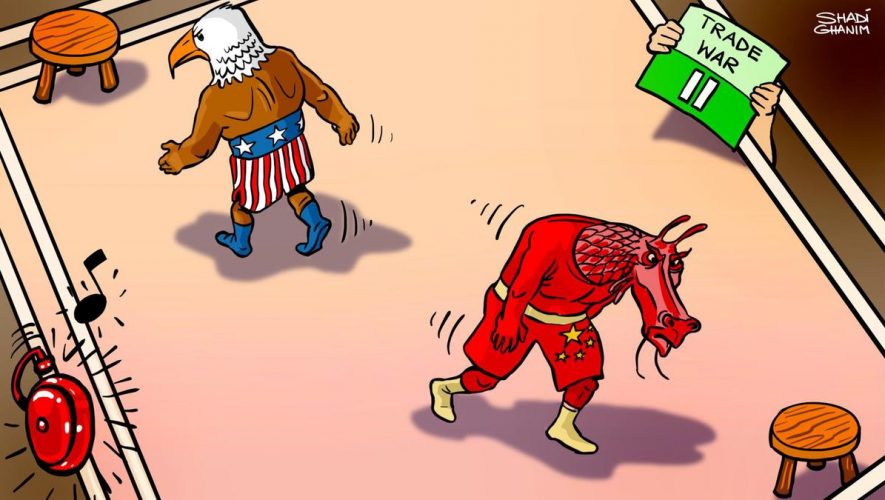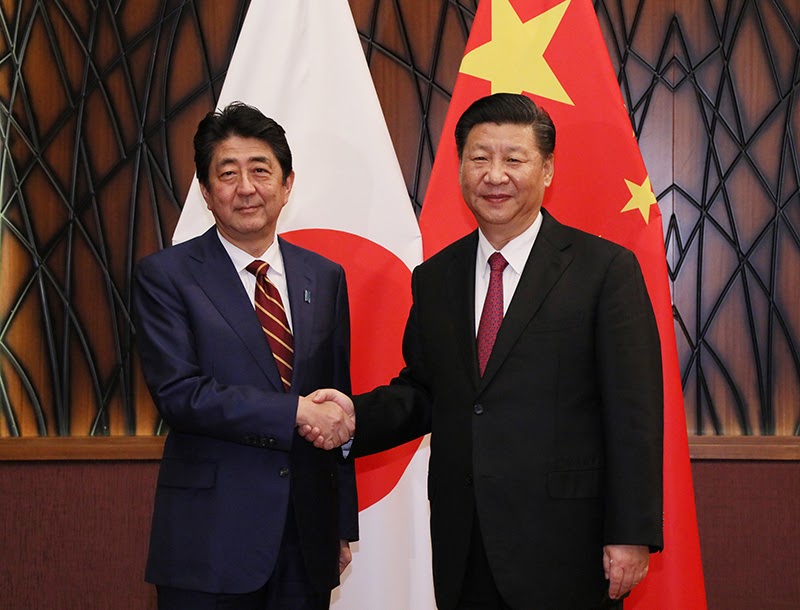Trump leads America in an era of poor relations with China, but have relations with China ever been good?
Donald Trump’s foreign policy has been rightfully criticized by many Americans. American prestige and credibility has taken an extraordinary nosedive since Trump came into office. There is, however, one relationship Trump has perhaps taken unjustified criticism over: the pan-Pacific relationship between reigning superpower America and ancient, reawakened, competing superpower China.
With an arms race and trade war raging, many believe Trump has damaged a potentially constructive relationship, as if Sino–American relations—which includes $737.1 billion of trade between two nuclear states—were once a glistening ship that could stay afloat if handled properly. But it’s worth asking whether good Sino–American relations were ever possible, if Trump actually worsened them, and if his policies are effective.
Just twice in history have the American and Chinese governments cooperated closely; both times occurred when a mutual and urgent adversary was present. The first was during the Pacific War, known to the Chinese as the War of Resistance, when a combined Sino–American effort drained and crushed the Japanese empire. Sino–American cooperation began even before the official American entry into the war. The second time only saw minimal agreement and occurred during the latter half of the Cold War, years after Chinese relations with the Soviet Union imploded into a frenzy of border disputes.
There are more tales of positive, albeit less meaningful, Sino–American relations, such as American contributions to Chinese education during a collapsing Qing Dynasty and symbiotic trade between the two. Indeed, several American towns are named “Canton” after the old English name for Guangzhou, which was, and still is, a bustling maritime trade and transit hub. The Sino–American relationship is older than American independence, and finds itself as globally imperative as it has ever been, with Donald Trump leading one of the two participating parties.
I. Clash of Cultures
“We must not be afraid, as Western people are, that the government will become too strong.”
– President Dr. Sun Yat-sen, The Three Principles of the People (1924)
Those who criticize Trump for confronting China must remember that the Chinese government, which operates via a hybrid of Confucian and Legalist virtues, does not adhere to the same philosophical priorities and historical lessons that the American and other Western governments do.
In Chinese history and philosophy, a good government maintains two things: tradition and unity. The Chinese government earns its legitimacy by keeping the country united and defended and by carrying on the legacies it inherited, at any cost necessary. National unity reigns supreme over all other priorities, and American values, such as individual freedom and democracy, are considered less important. This core Chinese belief, echoed by prominent Chinese thinkers such as Confucius and Sun Yat-Sen, explains why, to the Chinese government and people, national unity takes precedence over other priorities and values. This also explains why the Chinese and Western views of human rights are rarely compatible.
Many Chinese people, including those who have left China, want their government to be authoritarian, partly due to propaganda but largely due to philosophy and history. It is this very reason many Chinese people view pro-democracy Hong Kong protesters as unprovoked radicals. That is what happens when a country is five thousand years old, home to a billion-and-a-half people, and is the former jurisdiction of about twenty-eight historical dynasties, each violently torn apart in its own horrific civil war.
This disagreement is just one seemingly immovable obstacle between Sino–American relations. A more modern reason why a positive Sino–American relationship is impossible is also very simple: China will never accept the leadership of another nation.
A good illustration of why this is comes from the Chinese language, in which there are numerous names for “China.” The most commonly used term, Middle Kingdom (中国), illustrates the belief that the Chinese way of life is the core of civilization; an older term, All Under Heaven (天下), declares that the regions controlled by China are the only ones blessed by Heaven. The gate in Boston’s own Chinatown proudly displays the latter name. Another term, laowai (老外), can be used both positively and negatively as a slur for any non-Chinese and illustrates the sometimes awkward relationship between Chinese and non-Chinese.
The Chinese tend to believe their civilization is the most virtuous, and the Chinese government considers itself qualified to guide international relations. Being led by any other nation is often viewed as an abomination to Chinese identity and history. Influence from any other country, or from any system non-Chinese in origin, is considered an insult and a humiliation to the Chinese, and the Chinese government aims to subvert America until they dominate, not lead, the international hierarchy. Combined with the Chinese perception that America and the West are in decline, the only simple way for America to avoid conflict with China is to accept uncontested Chinese supremacy, as diplomacy has become increasingly difficult.
Trump demonstrates little understanding about Chinese history or philosophy, but he does understand one thing: Beijing is not interested in being lasting friends with Washington. Or Brussels. Or anyone else. While determining Chinese domestic policy is China’s sovereign right, Beijing’s ambitions to dominate the Asia-Pacific, and perhaps the world, are fair game to counter.
So, when considering Trump’s handling of Sino–American relations, observers should remember that China operates with an ancient philosophy that opposes the most basic values for which America has shed blood and gold, and the only way for Trump to avoid confrontation is to tolerate the development of a China-dominated international order. Not ideal.
America is not trying to contain China; Chinese talent, innovation, industry, academia, economic potential, market power, and military might are far too capable to be contained by a country across the Pacific Ocean with a population four times smaller. Rather, America aims to defend the region from Chinese ambition, which is an old tale for the Asia-Pacific.
II. Obama’s Gift to Trump
While it is true that relations under Trump are poor, relations under Obama were a far cry from positive. In just the first half of Obama’s first term, he repeatedly stated that America was China’s friend and welcomed its rise before promptly activating his “Pivot to Asia.” By announcing this policy, which repositioned concentrations of American military might from the Middle East to the Asia-Pacific, Obama made one thing clear to the Chinese: America is a threat. He made no fruitful efforts to combat Chinese exploitation of economies and intellectual property. Across eight years, Obama aimed to compel China to refrain from destabilizing Asia and contribute to the international system.
In the years since, Chinese encroachment has continued, and perhaps escalated. The Chinese government continues to sponsor espionage against American and other international competitors, directing both intelligence agencies and state-owned corporations to steal innovation secrets relating to anything from missiles to crops. The espionage does not stop at stealing blueprints; the Chinese government has also hunted for documents regarding internal strategies and, allegedly, the personal information of American citizens. The Chinese government, an entity preoccupied with preserving its sovereignty, continues its assault on the sovereignty of its competitors.
The Chinese government’s hypocrisy does not end there. Along with espionage, the Chinese government has long violated several of its international obligations, such as those under the World Trade Organization (WTO). In particular, the Chinese government has long tolerated and even promoted excess capacity, overproducing goods and exporting the excess at prices competitors cannot compete against, distorting international markets. Other frequent complaints toward the Chinese government include its disregard for accepted transparency standards required of WTO membership and its sponsorship of the acquisition of foreign companies, with the goal of facilitating economically inefficient technology transfers.
Economics aside, the Obama administration’s military posture has clearly not inspired Chinese acceptance of American leadership. Chinese military intrusions continue to threaten the sovereignty and transit lanes of numerous Chinese neighbors, and the Chinese government has feverishly invested in its war-waging assets, including a globally capable navy and drones for export. Along with being considerably more advanced than it was when Obama was inaugurated, the Chinese military actively identifies the US as an obstacle to its claimed security efforts.
By the beginning of the Trump administration, the philosophical incompatibility between the Chinese and American governments persisted, and the well-meaning Obama administration had both failed to mitigate Chinese government offenses and further justified their suspicions. The result is a China that invests lavishly in the ability to wipe out the American military, distrusts the global system and America, and still commits all the malfeasance Obama thought he was going to stop, such as intellectual property theft and invasive military patrols.
Obama entered his presidency with idealist views and goals. Not only is China now even more suspicious of all of that, it now boasts a much more capable economy than before, and their armed forces are building hypersonic nuclear-capable missiles. To this day, the Chinese continue their economic predations and military intimidations.
III. Confronting the Monolith
Trump, on the other hand, wasted little time defending American, and global, interests from Chinese predation, despite China being richer and better armed than before. Of course, Trump should not aim for a Cold-War-style tactic of isolation; China’s existence has gifted the world with greater economic stability and potential, while also producing gargantuan quantities of scientific research and engineering breakthroughs. Trump would be wise to avoid establishing a “bamboo curtain;” an absolute schism between China and America would be a great disservice considering their combined intellectual, scientific, and industrial might.
Despite vast Chinese contributions, the international community has complained for years of China intentionally lowering the costs of their export products and stripping intellectual property from foreign corporations to boost its own industry. Trump’s tactic of using tariffs and surveying Chinese acquisitions of American technology has shown that aggressive Chinese government activities will actually be resisted, something missed under Obama.
This tactic has not been without collateral damage; the tariffs have burdened American consumers, which is a glaring weakness in Trump’s China policy. However, Chinese economic policy aims to tilt the global market in favor of Chinese corporations and impedes the potential for Americans to fully benefit from Chinese industrial, economic, and scientific achievements, and not confronting Chinese actions would allow China to prey on American business and consumers nonetheless. While compelling the Chinese to open their market to foreign corporations is unlikely until Chinese corporations can compete, this does not mean America should tolerate intellectual espionage and predatory pricing.
While Americans indeed lose from Trump’s tariffs, they, along with many others, will definitely lose from Chinese policies. Chinese trade practices are estimated to cost Americans $225 billion to $600 billion a year, including intellectual property theft and excluding the cost of predatory pricing in export products such as steel.
Trump’s policy has shown China that its reckless ambitions will not go unopposed, all the while not isolating China severely and keeping the relationship focused on economics, not military assets. Of course, while Trump should receive credit for being the first, and practically only, world leader to confront Chinese predations, the rest of his foreign policy has fallen well short of objectives, and Trump’s China policy would be far more effective had he not fractured American alliances and prestige.
China is a monolith. In the event that Chinese expansion and influence are uncontested, authoritarian unity and Chinese dominance would risk being normalized to, or at least tolerated by, those who doubt liberal political philosophy. While Trump cannot and should not stop said beliefs from being pervasive within China, he can surely impede their influence on the world.
Trump took office when his counterparts in Beijing were promoting economically malicious policies that the global community had grown weary of. Beijing viewed American intentions with suspicion. While some of the burden of Trump’s actions have indeed fallen on those he claims to serve, Chinese ambitions have created uncertainty for the American public and much of the global community. Trump has not only made it clear such malfeasance will not be appeased, but has also shown enough restraint to prevent both a cold war and a hot war.
Now, if only he could connect his China policy to the rest of his foreign policy.



